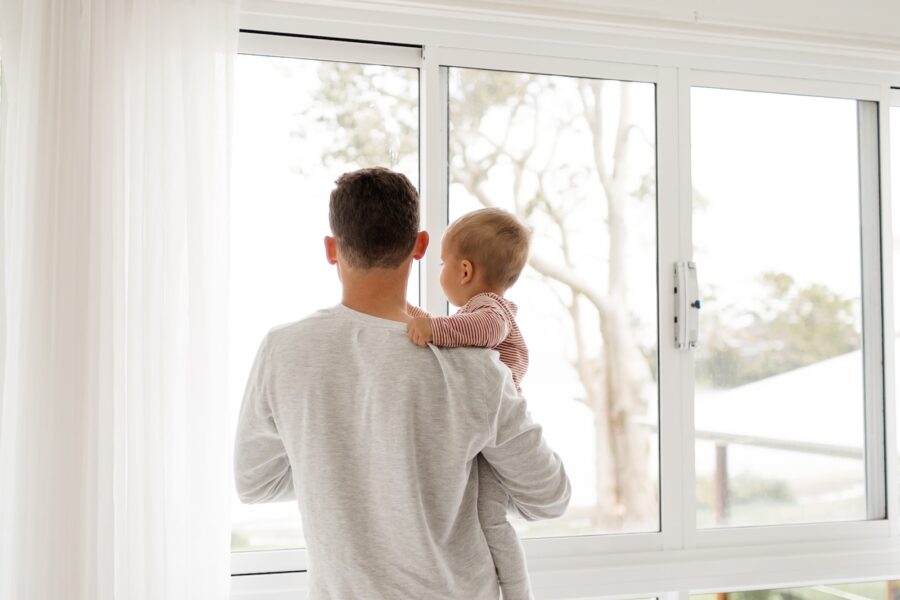Ante-natal and post-natal depression are mental health conditions that are widely believed to only impact the birthing parent. This is due to the physical changes and the emotional and spiritual journey that a woman goes through during pregnancy and childbirth. However, this is a common misconception. Post-natal depression and ante-natal depression can also affect the non-birthing parent.
The nine-month pregnancy period is a highly emotional time for both parents, filled with excitement and trepidation for what is to come.
Everything changes when a child is born and feeling that life will never be the same again can be overwhelming and often anxiety-inducing, regardless of whether you’re carrying the child or not. This can often be a trigger for post-natal or antenatal depression, leaving parents feeling they’re not good enough or struggling to bond with their new baby.
As many people will know, it’s incredibly difficult to live with someone who is suffering from a mental health condition, and this can often impact your own mental health. Throw a new baby into the mix, along with the lack of sleep and changes to the familiar routine that ensues, and both parents can be left struggling with heightened emotions.
A new baby is a life-changing experience, and it’s entirely natural to feel down during this period of transition.
It is claimed that at least 1 in 10 non-birthing parents experience post-natal or antenatal depression.
When assessing whether someone is struggling with possible depression, it is important to understand what symptoms they may be having, as the broad spectrum of mental health conditions means everyone will experience different symptoms.
For most people, emotional responses may be the first indication that something is wrong. These are usually the most overtly obvious symptoms. Some may notice their partner has a shorter temper, is feeling a lot more anxious, or more down than usual.
But emotional symptoms aren’t the only indicator of post-natal or ante-natal depression. Another common symptom is a feeling of guilt. Babies don’t come with instruction manuals, and many new parents struggle with feeling that they are not doing a good enough job or are not capable of looking after their new baby.
For some non-birthing parents, there is an emotional conflict. They may feel guilty for not enduring the physical side of childbirth – especially if their partner went through a difficult or traumatic birth – and yet feel down or depressed following the birth. This often leaves people feeling that they have no right to feel in such a way, further fuelling their negative feelings in a vicious cycle.
Cognitive symptoms tend to be undetected a little more as they can be easily passed off as someone “having their head in the clouds”, being indecisive, lacking concentration, or being more sensitive than usual.
Severe cases of post-natal or ante-natal depression can also include suicidal thoughts, which can often go unnoticed or undiscussed due to feelings of guilt. Thoughts of this nature can be worsened when physical symptoms start to catch up with new parents and take their toll, whether that’s changes in appetite, lack of sleep, or changes to sleeping patterns.
Whenever someone is struggling with a mental health condition, it can be challenging for their relationships. Many people unintentionally isolate themselves, which can leave one parent feeling as if they are doing everything on their own, causing further issues and frustrations.
As the saying goes, we take out on those who are closest to us.
Whether it’s becoming easily irritated by a partner, snapping, or withdrawing entirely from the new baby or any form of intimacy with their partner, these are all symptoms that someone is struggling with and seeking to isolate themselves.
Some may turn to alcohol or substance abuse whilst seeking temporary escape. However, while this may provide temporary respite, over time it usually makes things much worse and is not recommended.
If someone believes that they or their partner are struggling with antenatal post-natal depression then it is important to seek professional help as early as possible.
The earlier you seek help, the easier it is for a professional to provide support to help manage the symptoms or give you coping mechanisms before the condition becomes too serious.
There are also ways that employers can help if an employee is struggling following the birth of a new baby. An Employee Assistance Programme (EAP) provides support for both employees and immediate family members, including partners. This means that both parents would have access to services including 24/7 access to counselling to offload concerns, a lot quicker than going through the traditional routes.
At Health Assured, we regularly have new parents reaching out to us outside of what many consider ‘core’ business hours. This is often due to lack of sleep or privacy, adjusting to the new baby’s sleep cycle, etc. Knowing that someone is available regardless of the time of day can provide great reassurance in an emotional and unsettling time.
Many people also find benefits to practicing mindfulness. This can help give the small pick-me-up that a new parent needs to keep going through the day. Mindfulness can be many things, from getting outside for a walk to completing breathing exercises.
Offering benefits such as this not only aids employee well-being but is also a good way to show your employees that you are invested in the well-being of them and their families.

Kayleigh Frost
Kayleigh has full responsibility for the management and development of the occupational health teams at the UK and Ireland's leading mental health and wellbeing provider. She oversees the clinical management and governance of the organisation's wider network of affiliate counsellors and wellbeing practitioners and manages Health Assured's trauma and wellbeing provisions. Kayleigh is a qualified Mental Health First Aider and a regular guest speaker at industry-leading webinars and events.


